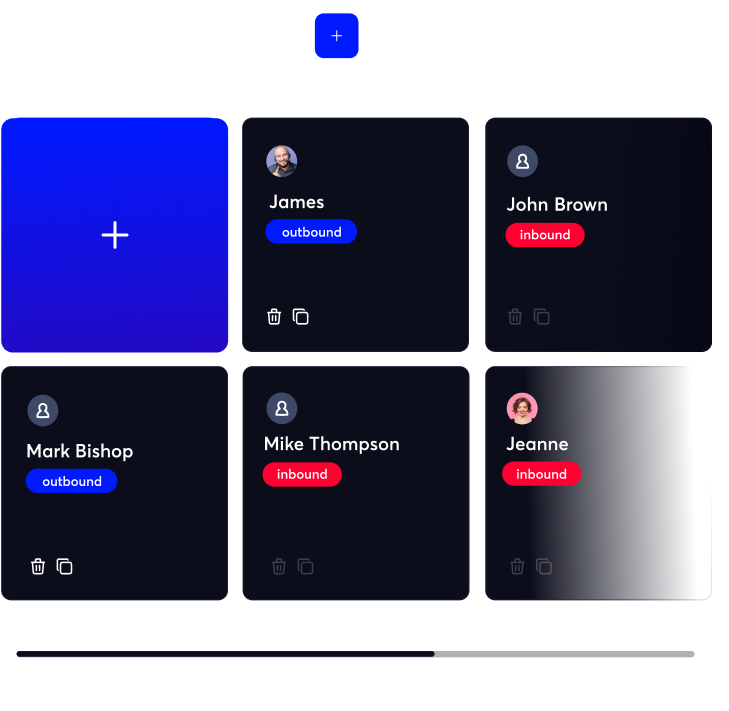Artificial intelligence (AI) is fundamentally transforming phone communications, creating a more personalized, efficient, and scalable environment for both businesses and consumers.
As AI technology advances, its application in phone calls is moving beyond simple automation to more sophisticated and empathetic interactions, impacting industries from customer service to healthcare.
The Future of Communication: How AI Phone Calls Are Revolutionizing Customer Service and Beyond
In an era of rapid technological advancement, AI phone calls are emerging as a game-changing innovation in the world of communication. This cutting-edge technology is transforming the way businesses interact with customers, streamlining operations, and opening up new possibilities for personalized service.
As we delve into the realm of AI-powered communication, we’ll explore how these intelligent systems are reshaping industries and what the future holds for this revolutionary technology.
Understanding AI Phone Calls: The Basics
At its core, an AI phone call utilizes advanced artificial intelligence and natural language processing to simulate human-like conversations.
These systems, often referred to as conversational AI or voice AI, can understand context, respond to queries, and even adapt their tone and language to suit the caller’s needs.
Unlike traditional automated phone systems, AI-powered calls offer a more natural and intuitive experience, often leaving callers unsure whether they’re speaking to a human or a machine.
The technology behind AI phone calls has made significant strides in recent years, with improvements in speech recognition, natural language understanding, and text-to-speech capabilities.
According to a report by Grand View Research, the global conversational AI market size is expected to reach $32.62 billion by 2030, growing at a CAGR of 20% from 2023 to 2030 [1]
AI-Powered Phone Calls: How They Work
AI phone systems rely on several core technologies—natural language processing (NLP), voice recognition, and machine learning. NLP allows these systems to understand and interpret human language, providing responses that mimic real conversations.
Machine learning enables AI systems to improve over time, continuously refining their ability to handle complex inquiries, while voice recognition adds another layer of security by authenticating callers based on voice patterns.
Transforming Customer Service with AI Phone Calls
One of the most significant applications of <keyword>AI phone calls</keyword> is in customer service. Virtual phone assistants powered by AI are revolutionizing how businesses handle customer inquiries, complaints, and support requests.
These AI-powered systems can:
- Handle multiple calls simultaneously, reducing wait times and improving efficiency
- Provide 24/7 support without the need for human staff
- Quickly access and provide accurate information from vast databases
- Escalate complex issues to human agents when necessary
- Learn from each interaction to improve future performance
A study by Juniper Research predicts that AI-powered chatbots and virtual assistants will save businesses $11 billion annually by 2023, up from an estimated $6 billion in 2018 [2].
This significant cost savings, coupled with improved customer satisfaction, makes AI phone calls an attractive option for businesses of all sizes
Benefits of AI Phone Calls
- Enhanced Efficiency and Scalability: AI-powered phone systems can handle multiple calls simultaneously, reducing wait times and streamlining workflows. Whether it’s managing inbound customer support or outbound sales, AI systems can operate 24/7, automating routine tasks like call routing, appointment scheduling, and data collection. This frees up human agents to focus on more complex, value-driven conversations. Businesses can scale these systems without the need for substantial infrastructure changes, making them a cost-effective solution for growing companies (CallFluent AI)
- Improved Customer Experience: One of AI’s greatest strengths is its ability to personalize interactions. By integrating with customer relationship management (CRM) systems, AI can tailor conversations based on a customer’s history and preferences. Sentiment analysis—where AI assesses the emotional tone of the caller—takes this further by enabling empathetic responses, boosting customer satisfaction. Immediate responses and seamless call routing also reduce customer frustration, leading to higher retention rates (CallFluent AI)
- Data-Driven Insights: AI systems analyze phone call data in real-time, offering businesses insights into customer preferences, pain points, and emerging trends. This analysis can inform product development, improve customer service strategies, and optimize marketing campaigns. For industries like finance and healthcare, AI also aids in security by detecting suspicious patterns, minimizing fraud risks (CallFluent AI)
Beyond Customer Service: Innovative Applications of AI Phone Calls
Use Cases FOR AI PHONE CALLING Across Industries-



- Customer Service: AI phone systems can instantly resolve common issues, track orders, and provide 24/7 support. This minimizes downtime and reduces the need for large customer service teams, leading to substantial cost savings. While customer service remains a primary use case for AI phone calls, the technology is finding applications in various other industries, such as the fallowing ones:
- Healthcare: AI phone calls assist with appointment reminders, medication information, and follow-up care, improving patient engagement and reducing no-shows and even conduct initial health assessments. For example, a study published in the journal Nature found that an AI system could accurately identify skin cancers from photographs with a level of competence comparable to dermatologists
- Sales and Telemarketing: In Sales & telemarketing industries AI phone calls are being used for lead qualification, appointment setting, and even conducting market research surveys. – AI analyzes customer data to tailor pitches, increasing conversion rates and improving the overall sales process
- Finance: Banks and financial institutions are using AI-powered phone systems for fraud detection, account inquiries, and even financial advice.
Challenges and Future Directions
Despite the numerous advantages, AI phone systems face some challenges, particularly in understanding diverse accents, dialects, and complex human emotions. Ensuring data privacy and security remains a key concern, as AI systems process sensitive information. However, continuous improvements in machine learning and emotional intelligence promise to address these limitations in the future
Looking ahead, AI’s integration into phone communications is set to deepen, with advancements in voice biometrics, real-time translation, and even more emotionally attuned responses.
As businesses adopt these technologies, AI phone calls will become indispensable in enhancing communication efficiency, driving customer satisfaction, and providing businesses with actionable insights.
The Role of AI in Call Center Automation
AI is fundamentally reshaping how call centers operate by automating routine tasks, enhancing agent efficiency, and improving overall customer service. Traditional call centers, which relied heavily on human agents for repetitive inquiries, are now integrating AI solutions like chatbots, virtual agents, and natural language processing (NLP) systems to streamline operations.

Key Areas of AI in Call Center Automation:
- Automated Call Routing: AI can analyze a caller’s query and direct them to the appropriate department or agent instantly. This reduces hold times and ensures that customers are connected with the right resource, increasing efficiency and satisfaction. Machine learning algorithms continuously improve routing precision by learning from past interactions
- Virtual Assistants for Common Inquiries: AI-powered virtual agents can handle routine customer inquiries like billing questions, account status, or password resets. This reduces the workload on human agents and allows them to focus on more complex tasks that require empathy or creative problem-solving
- Real-Time Assistance for Human Agents: AI supports live agents by providing real-time information, call transcripts, and relevant customer data during calls. Sentiment analysis tools can help agents respond appropriately to emotional cues, further improving the customer experience
- Call Analytics and Insights: AI systems can track and analyze call metrics such as average call time, customer sentiment, and common issues. This data helps businesses optimize call scripts, address service gaps, and develop more informed strategies for future customer interactions
Benefits of AI Call Center Automation:
- Increased Efficiency: By handling simple inquiries, AI systems reduce the volume of calls that need human intervention, allowing call centers to manage higher volumes without additional resources
- Cost Savings: Automating routine tasks minimizes the need for large customer service teams, reducing overhead costs while maintaining 24/7 service availability
- Enhanced Customer Experience: Customers benefit from quicker resolutions, reduced wait times, and more personalized service as AI systems analyze customer data in real time
Emotional Intelligence in AI Phone Calls
As AI continues to evolve, emotional intelligence (EI) is becoming a critical component in phone-based customer interactions. Emotional intelligence refers to the ability of AI systems to detect and respond to human emotions during a conversation, making interactions feel more natural, empathetic, and effective.
How AI Detects and Responds to Emotions:
- Sentiment Analysis: AI systems equipped with advanced NLP and sentiment analysis can interpret a customer’s emotional state by analyzing the tone, pace, and language used during a conversation. For instance, if a customer expresses frustration, the AI can flag this and adjust its responses to be more empathetic and calming
- Speech Recognition and Tone Analysis: Beyond text-based sentiment analysis, some AI systems can assess vocal cues such as stress, excitement, or anger, and adjust their tone accordingly. This level of responsiveness helps the AI emulate human-like conversation flows
- Empathetic Responses: AI systems are now being trained to use language that conveys understanding and empathy. For example, if a customer expresses dissatisfaction, the AI can respond with phrases like “I understand how that could be frustrating” before offering a solution. This increases customer satisfaction and improves the overall experience
Benefits of Emotional Intelligence in AI:
- Improved Customer Satisfaction: By recognizing emotional cues and responding empathetically, AI systems can defuse tense situations more effectively than emotion-neutral systems, leading to higher customer satisfaction
- Tailored Interactions: Emotional intelligence allows AI to personalize its responses based on the emotional state of the customer, creating a more nuanced and human-like interaction. For example, AI can offer faster solutions to frustrated customers or provide more detailed responses to inquisitive ones
- Support for Human Agents: Emotional intelligence tools not only improve AI interactions but also assist human agents by highlighting emotionally charged situations. This allows human agents to intervene when necessary, providing a balance between automated and human-driven solutions

The Future of AI Phone Calls: What’s Next?
As AI phone calls continue to evolve, we can expect to see several exciting developments in the near future:
Enhanced Emotional Intelligence
Future AI systems will become even more adept at recognizing and responding to human emotions, allowing for more empathetic and personalized interactions. This could revolutionize fields like mental health support and crisis management.
Multilingual Capabilities
Advancements in natural language processing will enable AI phone systems to seamlessly communicate in multiple languages, breaking down language barriers in global business and customer service.
Integration with Other Technologies
AI phone calls will likely integrate with other emerging technologies such as augmented reality (AR) and the Internet of Things (IoT), creating more immersive and interactive experiences for users.
Predictive Analytics
By analyzing patterns in customer interactions, AI phone systems will be able to predict customer needs and proactively offer solutions, enhancing the overall customer experience.
Preparing for an AI-Powered Communication Future
As AI phone calls become increasingly prevalent, businesses and individuals alike must prepare for this shift in communication technology.
Here are some steps to consider:
- Invest in AI literacy and training programs for employees
- Develop strategies to balance AI automation with human touch points
- Stay informed about advancements in AI technology and industry best practices
- Prioritize data security and privacy in AI implementations
- Collaborate with AI developers to create customized solutions for specific industry needs
Conclusion
AI is rapidly advancing in the call center space, not only by automating tasks and improving operational efficiency but also by developing emotional intelligence to make interactions more empathetic and personalized.
As we look to the future, it’s clear that AI-powered communication will play an increasingly important role in our personal and professional lives.
By embracing this technology and addressing its challenges head-on, we can harness the full potential of AI phone calls to create more efficient, personalized, and effective communication experiences for everyone.
This blend of AI and human-like responsiveness promises to redefine customer service, making it more efficient and emotionally aware than ever before.
To stay ahead of the curve, businesses and individuals should actively explore the possibilities of AI phone call technology and consider how it can be integrated into their communication strategies. The future of communication is here, and it’s powered by AI.

